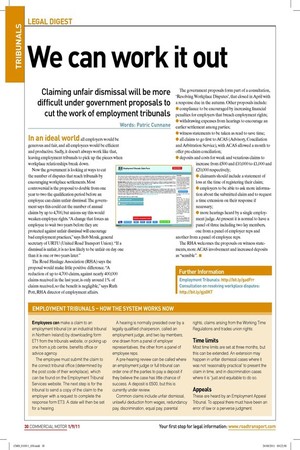We can work it out
Page 26

If you've noticed an error in this article please click here to report it so we can fix it.
Claiming unfair dismissal will be more difficult under government proposals to cut the work of employment tribunals
Words: Patric Cunnane In an ideal world all employers would be
generous and fair, and all employees would be eficient and productive. Sadly, it doesn’t always work like that, leaving employment tribunals to pick up the pieces when workplace relationships break down.
Now the government is looking at ways to cut the number of disputes that reach tribunals by encouraging workplace settlements. Most controversial is the proposal to double from one year to two the qualiication period before an employee can claim unfair dismissal. The government says this could cut the number of annual claims by up to 4,700, but unions say this would weaken employee rights. “A change that forces an employee to wait two years before they are protected against unfair dismissal will encourage bad employment practices,” says Bob Monk, general secretary of URTU (United Road Transport Union). “If a dismissal is unfair, it is no less likely to be unfair on day one than it is one or two years later.” The Road Haulage Association (RHA) says the proposal would make little positive difference. “A reduction of up to 4,700 claims, against nearly 400,000 claims received in the last year, is only around 1% of claims received, so the beneit is negligible,” says Ruth Pott, RHA director of employment affairs. The government proposals form part of a consultation, ‘Resolving Workplace Disputes’ , that closed in April with a response due in the autumn. Other proposals include: • compliance to be encouraged by increasing inancial penalties for employers that breach employment rights; • withdrawing expenses from hearings to encourage an earlier settlement among parties; • witness statements to be taken as read to save time; • all claims to go irst to ACAS (Advisory, Conciliation and Arbitration Service), with ACAS allowed a month to offer pre-claim conciliation; • deposits and costs for weak and vexatious claims to increase from £500 and £10,000 to £1,000 and £20,000 respectively; • claimants should include a statement of loss at the time of registering their claim; • employers to be able to ask more information about the submitted claim and to request a time extension on their response if necessary; • more hearings heard by a single employment judge. At present it is normal to have a panel of three including two lay members, one from a panel of employer reps and another from a panel of employee reps.
The RHA welcomes the proposals on witness statements, more ACAS involvement and increased deposits as “sensible” . ■














































